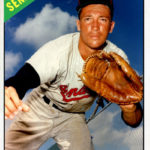In 267 innings, he earned seven victories, two of which were complete games, as well as four saves. All told, he made 97 appearances, 29 of which were starts.
Nowadays, those numbers would guarantee a minimum pension of $34,000. But Duckworth doesn’t receive anywhere near that amount.
Duckworth doesn’t receive a traditional pension because the rules for receiving MLB pensions changed in 1980. Duckworth and the other men do not get pensions because they didn’t accrue four years of service credit. That was what ballplayers who played prior to 1980 needed to be eligible for the pension plan.
Instead, men who played prior to 1980 who accrued at least 43 game days of service receive nonqualified retirement payments based on a complicated formula that had to have been calculated by an actuary.
In brief, for every quarter of service a man has accrued, which is defined as 43 game days of service, he gets $625. And that payment is before taxes are taken out. Men who didn’t accrue at least 43 game days of service on an active MLB roster don’t receive any monies.
By contrast, the maximum allowable pension a retired MLB player who is vested can make is $220,000. Even the minimum pension for a post-1980 player with only 43 game days of service is a reported $34,000.
What’s more, the payment cannot be passed on to a surviving spouse or designated beneficiary. So none of Duckworth’s loved ones will receive that payment when he dies.
These men are also not eligible to buy into the league’s umbrella health insurance coverage plan.
They are being penalized for playing the game they loved at the wrong time.
Though Forbes recently reported that the current players’ welfare and benefits fund is valued at more than $2.7 billion, the MLBPA has been loathe to divvy up more of the collective pie. Many of the impacted retirees are filing for bankruptcies at advanced ages, having their homes foreclosed on and are so poor and sickly they cannot afford adequate health insurance coverage.
According to baseball historian Andrew Martin, who wrote that Duckworth’s post baseball life included working for the California Highway Patrol, Duckworth had a pronounced fear of flying that actually caused him to once miss an entire weekend series with the (then) California Angels.







